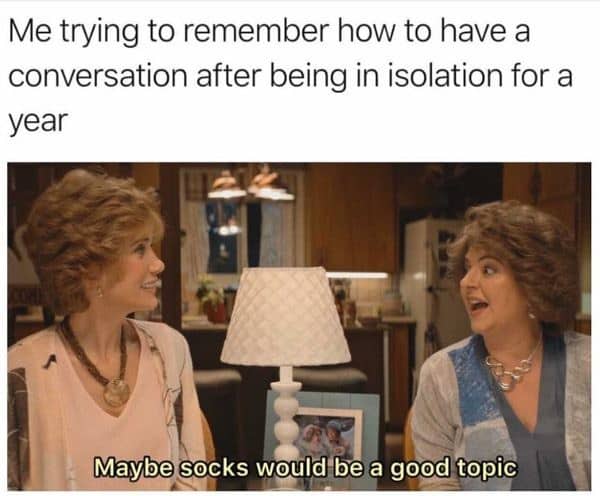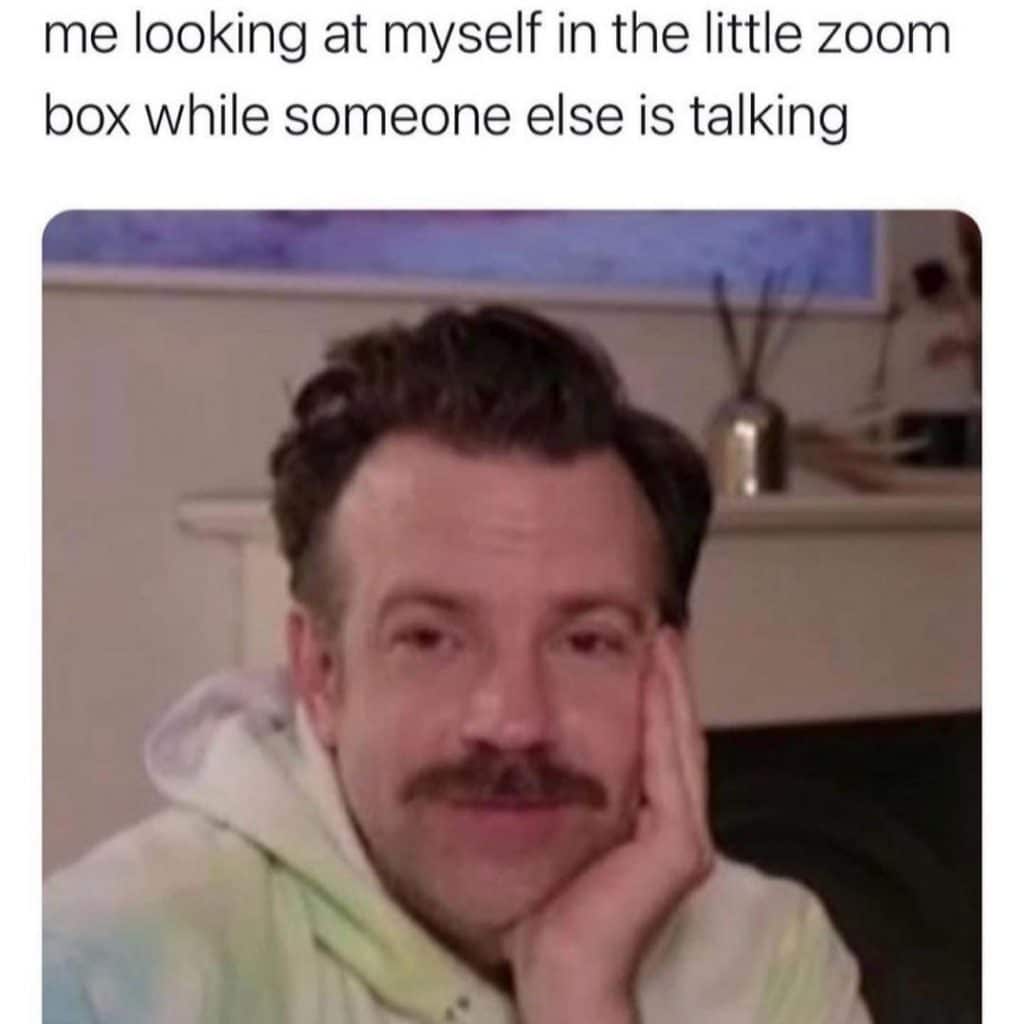Have you ever tried to play a musical instrument after not playing it for a long time? Or speak a language you haven’t spoken in a while? You were likely a bit rusty. The same thing can happen with social skills after a period of altered or limited interpersonal interactions. Perhaps you have been at home a lot more during the pandemic. Or you’re reentering the job market after time away. You have been in prison, or you’ve been involved in a prolonged period of caregiving, or you’re emerging from a long illness.
Many people feel like their social skills are rusty after a big life change. If your brain feels like it’s not working in quite the same way, it’s not your imagination. Social isolation actually decreases cognitive function, and prolonged isolation affects memory and verbal recall. You may have some “social muscles” to rebuild, and that’s totally normal.

Even if you’ve maintained your social calendar, you may be doing more remote work. On a video call, you lose 90% of the nonverbal cues you get in person, and true eye contact is not possible. In addition, staring at yourself on screen as you talk and listen can introduce new stressors. Stanford researcher Jeremy Bailenson calls this an “All Day Mirror,” and recommends hiding your own video when possible. Here’s how to hide your self-view on Zoom, Google Meet, and Microsoft Teams.

The experience of rebuilding social muscles will be different for people of different DiSC styles. Our advice for people of all styles is to practice empathy, assess where you are, challenge yourself a bit at a time, and keep the momentum going.
1. Remember that social skills come in a wide variety
If everyone interacted with each other in the same manner, this would be a very boring world indeed. We should allow ourselves authenticity in our interactions, and extend the same invitation to others.
Beyond cultural and neurodiversity factors, people show up in various ways in social spaces based on their personalities. An assessment like Everything DiSC Agile EQ can help you understand how your natural mindsets shape your interactions, and how people of other mindsets experience the same interactions differently.
2. Go easy on yourself and others
This is a chaotic time with many intersecting stressors, and everyone is dealing with a lot (including you!). Even beyond the global upheaval of the past few years, you never know what people you meet are dealing with in their personal lives. As you interact with people throughout the day:
- Be curious.
- Be kind.
- Have a sense of humor about awkward situations.
- Assume good intentions before jumping to defensiveness.
- Treat both others and yourself with a little extra generosity of spirit.
You can prime your brain for kindness by doing a 5-minute compassion meditation in the morning or before social situations.
3. Do a self-assessment
Where do you get your energy? Do you enjoy one-on-one discussions or group settings? What do you like about the way you show up in social interactions, and what do you wish you did better?
If you’ve never taken a DiSC assessment before, Everything DiSC Workplace is a great place to start. Though it’s called “Workplace,” the self-knowledge it provides—as well as knowledge of other people’s styles—is useful beyond work environments.
For example, someone with an S style often gets energy from supporting others. Easing back into social life might be more fun for them if they’re helping people, whether through volunteering or assisting a friend with running errands.
People with C styles may have a natural tendency to wait for others to initiate social contacts. Once they understand this tendency, they can be intentional about reaching out. This might also mean calling someone or meeting in person rather than sending an email or text.
Conversely, a person with a D or i style might be rushing people back to “normal” and not recognizing that others need the reassurance of psychological safety or just more time between meetings. Others might not be as eager for more in-person occasions.
4. Be realistic about the stakes

You say something awkward at the proverbial water cooler. You talk too much or too little at a friend’s dinner party. You decide to try something new and end up not liking it. You reach out to an acquaintance and they don’t respond. So what? What is really at stake here? “A lot!,” you might say, and detail the chain of bad consequences that could domino out from something you said or did. But—without minimizing those concerns, or the importance of small interactions—the fact is that very rarely does the fate of a nation rest on your coffee break banter (unless you have a very different job than most of us . . . ).
One way to develop a realistic view of the stakes of social situations is to think of a recent conversation where you didn’t speak up, or a recent social opportunity you turned down for fear of messing up. Imagine you had spoken up, or had gone to the event. Write down the worst-case reaction, and the best. Next time a similar opportunity comes, take it. Then compare the results with what you wrote down. Chances are, what actually happened was not the best or worst scenario, but somewhere in between, because that’s how life usually works.
Interrupting someone at happy hour is not the end of the world. And if something awkward happens, turn it into an opportunity to follow up with the friend or colleague in question, modeling that generosity of spirit we talked about earlier: Sorry—I feel like I interrupted you a lot at happy hour yesterday. My people skills are still a bit rusty from lockdown! Can we meet up again soon?
5. Practice active and intentional listening
You don’t need to cover every detail of the past few years over one cup of tea. Share freely, but make sure you’re listening, too. Some tips for intentional listening:
- Set aside distractions when people are talking to you.
- Stay in the present moment with the speaker, rather than planning out what you’re going to say next, then waiting for them to stop talking so you can say it.
- Be curious! Ask follow-up questions. Learn something new.
- Don’t try to solve every problem. Sometimes people want to share about a difficulty they’re having and don’t need you to try to fix it. If you’re not sure what they want from you, just ask! I’m really sorry you’re going through this. Do you want my help to talk through some solutions, or is it more helpful if I just listen right now?
- Think of people you know who are good listeners. What makes them good? How do you feel when you’re talking to them? What can you learn from them to improve your own listening skills?
There’s wisdom in the saying, “Speak only if it improves upon the silence.” But if you are too reticent while the other person is sharing, that can also make for an awkward conversation. Do ask follow-up questions and focus on listening, but when it’s natural for you to add your own stories, don’t hold back. If someone shares a lot of personal stories with you and you don’t share anything about yourself, they may wonder why you didn’t feel you could open up to them. One aspect of intentional listening is speaking.
6. Keep the momentum
There is no shame in putting friendship tasks on your calendar or to-do list. Texting your friend to see how their weekend was is not less authentic because you set an alert to do so. In addition to casual text, social media, email, or phone check-ins, here are some ideas for keeping in touch with people:
- Follow up after hanging out. It was so good to see you today is always a nice text to get. Beyond that, you can keep the social momentum by scheduling another time to get together or continuing a conversation you started. Here’s a link to that article I was talking about. Or, That project you’re working on with marketing sounds so interesting. Will you let me know how the presentation goes?
- Schedule regular events. It’s wild how quickly months can go by after you and a friend agree to “meet up soon!” Getting something regular on the calendar, even if it’s once every few months, helps make sure you don’t lose touch.
- Block off time for reaching out. On your own calendar, block off 30 minutes a few times a week to devote to answering that lingering email from your aunt, calling a friend, getting some of those social events scheduled, or writing a quick postcard just to let someone know you’re thinking about them. Prioritizing personal connections in this way is good for your emotional health, and lets people in your life know they are important to you.
Working on your social skills starts with self-awareness. The DiSC model is one way to learn about yourself and others and get practical tips for developing interpersonal skills. To learn more, see What is DiSC?

